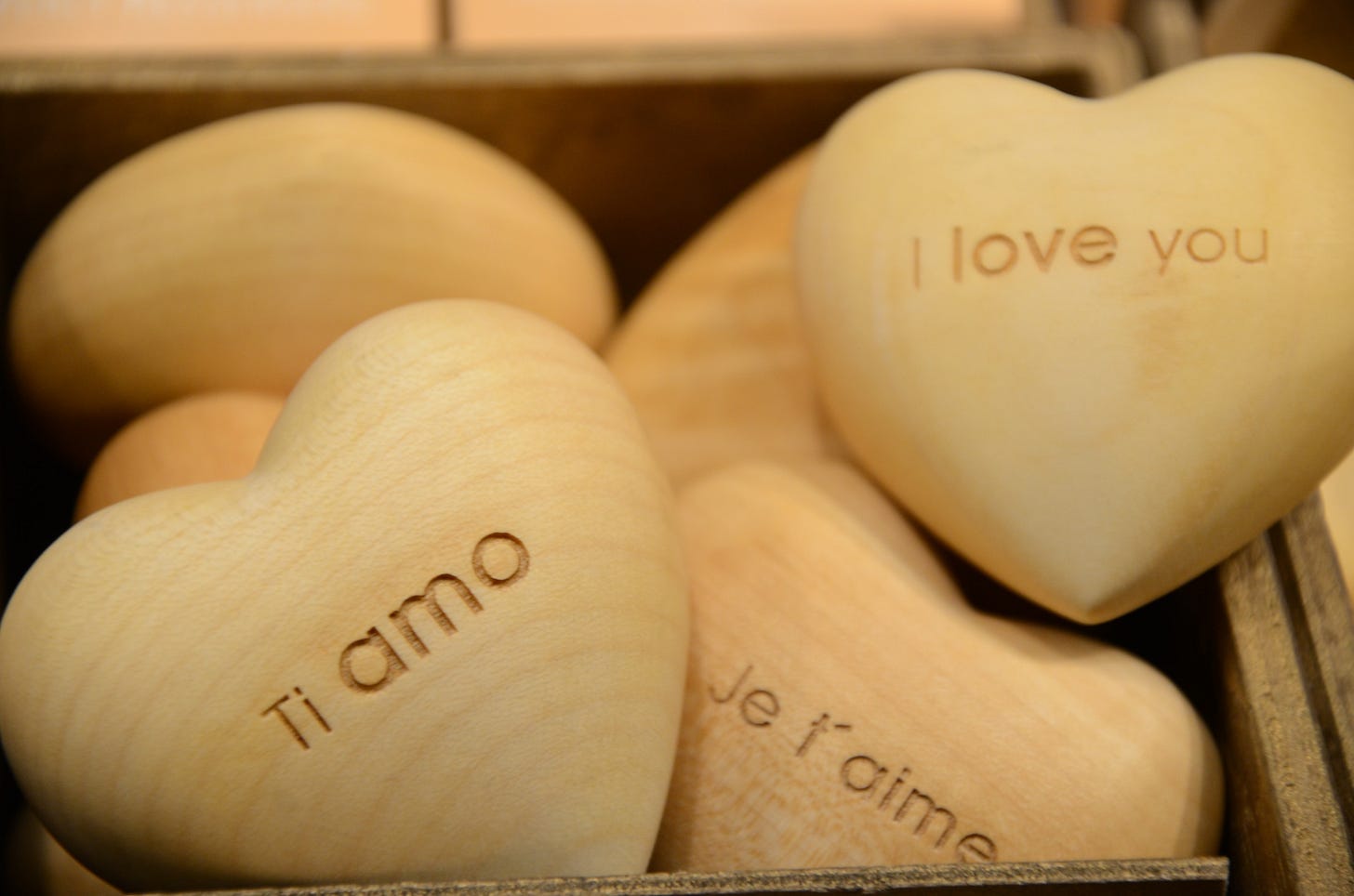Let Yourself Be Loved, Because Love is the Stuff You're Made of
“Let yourself be loved! The soul cannot live without love because love is the stuff she’s made of, and through love God has created her." (St. Elizabeth of the Trinity & St. Caterina of Siena)

“Faith, hope, love, and the greatest of these …”
We all know the rest of this famous quote from St. Paul (1 Cor. 13:13). If you have no clue what I’m talking about, please stop reading this article, dust off your Bible, and begin a daily habit of Scripture studies.
With that established, let’s continue. Here’s a crucial question I think we’ve all asked at one point or another in our lives:
If it’s the greatest of all virtues, why is love so difficult?
(Quick answer: precisely because it’s the greatest of all virtues. The greatest doesn’t come with ease, but with fortitude, understanding, patience and strength – Matt 7:13-14.)
There are many challenges to authentic love, but in this post I want to focus on just one—and the one that’s quite often the most difficult.
Love of Self.
For most people it’s easier to love others than to truly, selflessly love oneself.
Selfless love of self—what is that?
God is the very essence of Love. He created the world in love. He gave of Himself in love. He knit you together in your mother’s womb, which means you’re wondrously made in His love, perpetually lying in His hands (Ps. 139:13-14 and Isa. 49:16).
God’s Love is the Holy Spirit. The Spirit is the divine love of Father to Son and Son to the Father. It’s the love of God to His children. And we—all of us—are His children.
Jesus has told us to “love your neighbor as yourself” (Mark 12:31). We’ve heard this verse so many times that we’ve likely lost sight of the fullness of its meaning. We tend to focus on the “love your neighbor” bit, and gloss over the rest of what Jesus is telling us.
“As yourself.”
The Master is presupposing that we authentically love ourselves. This isn’t a narcissistic, pompous self-love, because “love is not boastful; it is not arrogant or rude” (1 Cor. 13:4-5). This is selfless self-love, built upon true charity.
Nowadays we tend to think of charity in terms of giving a few bucks to the offertory during Sunday Mass, donating our too-small jeans to the Salvation Army, or walking a 5k for Alzheimer’s research. While those are certain types of charity, they’re not what St. Paul is talking about, nor is it what Jesus is referring to when he says, “Love your neighbor as yourself.”
The Greek word for this type of charity (love) is agapé, which also means goodwill and benevolence. This is a pure love filled with compassion, deep empathy, and a desire for communion on an authentic, integrated level. In other words, agapé is a completely self-giving love, without expectation of anything in return. Agapé is the unreserved, unattached, unadorned expression of total self-giving. It’s the true essence of love, the foundation of all types of love. In truth, it’s the foundation of all life.
And this is how we must love ourselves.
But how do we apply agapé to self? How can we look at all our flaws, remember the many ways we’ve failed, grieve over those we’ve hurt, and stop the voices inside our heads telling us we’re stupid, unlovable, or unwanted, and instead look upon ourselves with kindness, forgiveness, peace …
And love.
How can we have faith, hope, and love toward ourselves?
The answers rests in the hands of God. “Behold, I have engraved you on the palms of My hands” (Isa. 49:16).
We’ve all been made in the image and likeness of God (Gen. 1:26). This means our soul—the innermost core of ourselves, our animating principal and the source of our authenticity—sparkles with the grace of God.
“Love is the stuff we’re made of” (St. Caterina of Siena).
The first step in learning to love yourself is to remember who you truly are. Rather than focusing on the fact that you’re a fallible human being who has made mistakes—perhaps huge ones—it’s crucial to understand your true self (a child of God, made in His image). In order to live a life of virtue and grow in beatitude, you have to continuously remind yourself that your soul is the very image of God (Gen. 1:26), and your body is the temple of the Holy Spirit (1 Cor. 6:19).
God adores you. You’re His beloved child.

God is also infallible and infinite. That means two things: first, since God is infallible, He obviously doesn’t make mistakes, therefore His deep devotion and love for you isn’t a mistake. God doesn’t love unlovable people, so this must mean that you’re not unlovable—even though you may sometimes feel that way. God hates unlovable acts (i.e. sin), but He loves the sinner, and always forgives our trespasses—as long as we ask for forgiveness, and genuinely seek not to repeat our violations (Matt. 6:12, 7:7).
If God finds you lovable, who are you to disagree with Him?
Second, God is infinite. This means His love for you is also infinite. It’s always there, and always will be. Because of this deep and unending divine agapé, love of self can become transformed through love of God. They work together in a swirling, beautiful wave.
How can we love God? How can we truly, authentically allow ourselves to feel like His child, to come to know Him in a way that reaches beyond merely going through the motions of religion, or claiming to be Catholic and even attending weekly Mass, yet without true devotion?
It all begins with prayer. With an active prayer life, everything will fall into place. I don’t have enough space in this article to write more about prayer, but I’ve received so many requests for a follow-up to my last post, “Pray Constantly, In the Name of Jesus,” that I’ll definitely be writing more. Stay tuned!
But back to love of self, which can feel undeserved and scary. Vulnerability is a huge issue for many of us, and love is the most vulnerable thing a person can do—especially love of self. Just remember, “there is no fear in love, but perfect love casts out fear” (1 John 4:18).
Be determined to trust instead of giving in to fear. Let it go. Let yourself go … into God, who is the ultimate expression of agapé.
Authentic Love.
St. Elizabeth of the Trinity, as she lay dying of a stomach ailment at the age of 26, wrote to her prioress—and by extension to us all:
“Let yourself be loved! That is, without fearing that any obstacle will be a hindrance to it.”
Let yourself be loved!
By others, by self—and by God.
When you let yourself be loved—when you allow the peace of God’s love to tumble through you, enthrall you, capture you completely—you’ll open the doors to allowing the fullness of love to enter, with psalms of praise and palm fronds of joy.
What God really wants from you is you. Live within the depths of your soul. Give yourself to Him, and the rest will slide into place.
Love transforms one into what one loves” (St. Caterina of Siena).
To love is to take a chance at being vulnerable, which allows you to reap the greatest rewards. All you have to do is gaze at the resurrected Christ to realize that.
Allow yourself to be vulnerable. All the rest will fall into place—joyfully, wondrously, lovingly. Don’t believe it? Give it a try. See what happens. I dare you. Allow yourself to be vulnerable, within the grace and charity of God.
And then watch your beginning begin.
"Let your walls down, your carefully constructed fortresses breached, your fiercely guarded heart laid bare. Let your wounds be touched, your fears revealed, your deepest desires, damaged dreams, and most daring hopes unveiled before the Bridegroom, who has the power to redeem, restore, and resurrect them. Drop your independence and the idea- which you clutch so tightly- that you can do anything to protect and save yourself. And let Him love you." (St. Elizabeth of the Trinity)











I need to be reminded of this quite often!
One cannot give what one does not have. If I don't love myself, I don't have love to give to others. I pray for this gift of love every day!